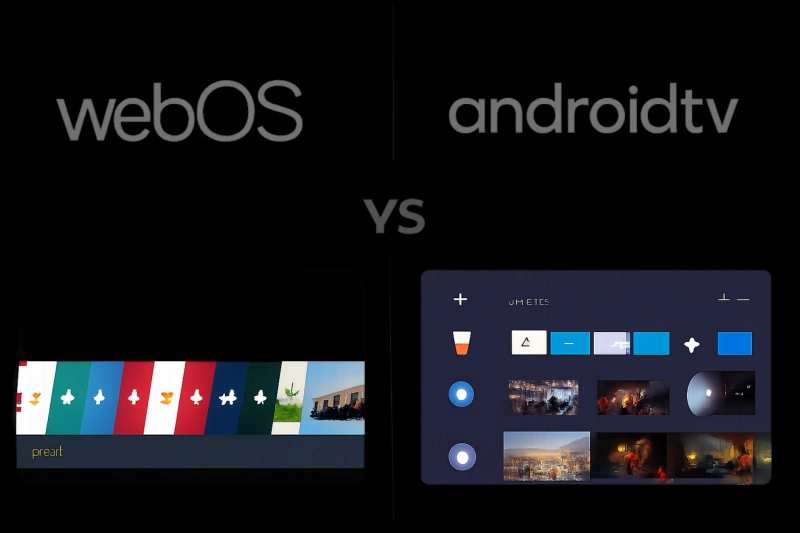Buying a smart TV today is like walking into an ice cream shop with 40 flavors — you think you know what you want, but then the choices start to pile up. Two of the biggest “flavors” in the smart TV world are WebOS (found mainly on LG TVs) and Android TV (used by brands like Sony, TCL, and others). On the surface, both promise smooth streaming, fun apps, and enough features to keep you entertained. But once you dig in, their personalities couldn’t be more different.
If you’re wondering which is better for streaming, gaming, and all the extras, here’s a breakdown — in plain English.
Streaming: The Core Battle
Let’s be honest — for most people, a smart TV is basically a big screen for Netflix, YouTube, Disney+, or whatever your favorite platform is. In that sense, both WebOS and Android TV do the job well.
WebOS has a clean, colorful interface that feels friendly right out of the box. Apps sit on a ribbon at the bottom of the screen, so you can hop between them without leaving what you’re watching. LG’s store has most of the major streaming apps covered, though you might notice the odd niche service missing.
Android TV, on the other hand, taps into Google Play. That means a bigger library of apps — including some more obscure streaming services and regional content. It also integrates beautifully with Chromecast, so you can throw videos from your phone to your TV instantly.
For the everyday streamer, it’s a tie. But if you like variety and you’re a fan of Google’s ecosystem, Android TV has a slight edge.
Gaming: Casual vs Hardcore
Not all smart TV gaming is created equal. If you’re plugging in a PlayStation or Xbox, the operating system matters less than the TV’s hardware specs. But if you’re talking about built-in cloud gaming, this is where differences show.
WebOS offers cloud gaming options like GeForce NOW on newer models, and LG has been improving controller support. It’s great for casual gaming or trying out titles without downloading them.
Android TV leans more into gaming, partly because of its app store. It supports services like Nvidia GeForce NOW, Xbox Cloud Gaming (in some regions), and even some Android-based games you can install directly. Pair it with a Bluetooth controller and you’ve got a surprisingly decent living room gaming rig.
For now, Android TV takes the gaming crown, especially for players who want more than just the basics.
Voice Control and Smart Features
Both systems support voice commands, but the experience feels different.
WebOS uses LG’s ThinQ AI and works with Google Assistant and Alexa on many models. It’s responsive, but you can tell the focus is on TV controls rather than full smart-home integration.
Android TV has Google Assistant baked right in, and because it’s part of Google’s ecosystem, it plays nicely with lights, thermostats, cameras — basically anything you can hook into Google Home.
If you already have a house full of Google gadgets, Android TV feels more like home.
Updates and Longevity
Smart TVs age faster than you think, and software updates can be the difference between a TV that stays snappy and one that feels ancient after three years.
WebOS updates are tied closely to the TV model — LG typically supports their sets well, but major new features often arrive on newer TVs first.
Android TV tends to push updates more universally, and app compatibility lasts longer thanks to Google Play’s huge developer base.
If you want the most future-proof choice, Android TV generally has the longer runway.
Ease of Use
This is where WebOS shines. Its interface is visually inviting, the menus are easy to navigate, and you don’t need to be tech-savvy to find what you’re looking for. Even switching inputs feels fast.
Android TV can feel busier at first. It gives you tons of options and recommendations, but for some users, that’s more overwhelming than helpful. Once you tweak it to your liking, though, it’s incredibly flexible.
So, Which One Wins?
If you want a plug-and-play experience for streaming, with a clean interface and just enough features to cover your needs, WebOS is a fantastic choice.
Both platforms let you binge your favorite shows, stream music, and even enjoy some casual gaming. But when comparing WebOS vs Android TV, the real decision comes down to whether you value the elegant simplicity of WebOS or the do-it-all versatility of Android TV.
If you’re looking for maximum versatility — more apps, deeper gaming integration, stronger smart-home control — Android TV is the one to beat.
Both will let you binge your favorite shows, stream music, and even play a few games. It really comes down to whether you prefer the simplicity of WebOS or the do-it-all approach of Android TV.
In the end, the “smart TV showdown” doesn’t have a universal winner — just the winner that fits your living room and lifestyle best.



